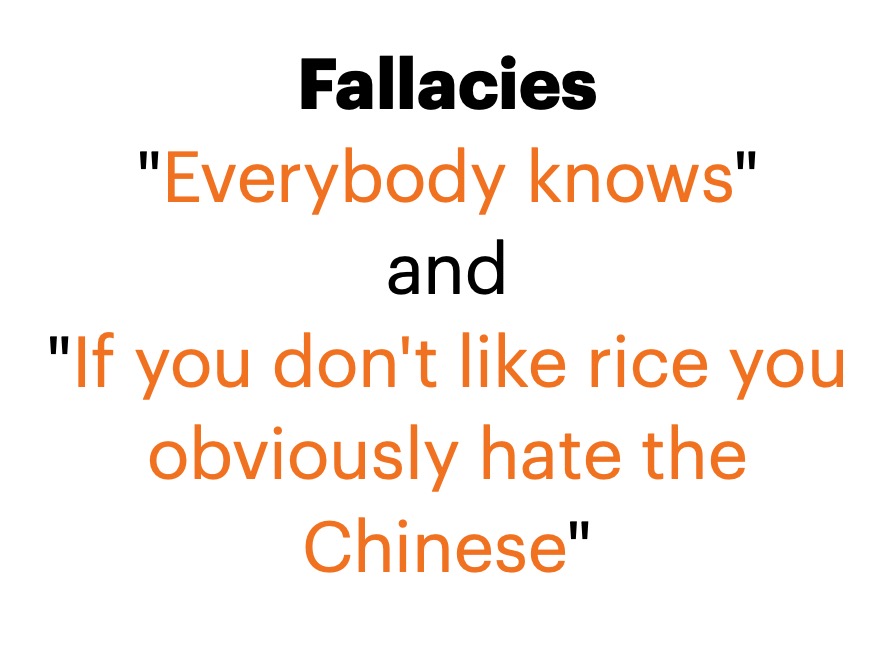| Issue September-12 | ||
 |  |
|
| ·Home ·Politics ·News ·Sport ·Life ·Culture ·World ·Essays ·Technology ·About | ·Archive | |
| ||||||||||||||
Our series on logical fallacies or fallacious arguments #1 |
 |
Fallacious Argument It is probably true to say that most of us are confronted with fallacies. With arguments that are just offered to kill our opinion. In fact the very beginning of this article 'it is probably true to say' is in itself a fallacious argument. How do we know it it true to say, whether probably or not? Recently we stumbled across a paper that the University of Miami uses to teach students what types of fallacious arguments are commonly used. True to our belief, that we should not steal ideas form others without due acknowledgement the following introduction is from the University. We don't believe we could phrase it any better. Fallacies are everywhere. Politicians, celebrities, and almost anyone else in a position to influence others often resort to faulty reasoning to try to advance their beliefs. In addition, many of us - whether we know it or not - have a tendency to sidestep coherent, logical, and legitimate argument, supplanting it instead with nothing more than rhetorically persuasive language. Even though fallacious arguments can be quite convincing (sometimes more so than non-fallacious ones depending on your audience), they are still errors in reasoning and you should never use them in a debate setting to justify a claim. By knowing some of the more common fallacies ,that will be listed below [sic], you will gain the ability to strengthen your own ethics arguments; and, of equal importance, gain the ability to effectively criticise and rebut the fallacious arguments of your opponents. In addition to the list of fallacies given by the University we will add a couple of our own. The atomic bomb argument: 'Everybody knows.....' This is probably one of the most common means of stopping your discussion partner dead in their tracks. Just a little thought exposes immediately the fallacy of this intro. How likely is it that "everybody" knows what you are about to force down our throats. Classic examples in recent times and very common in the press is the argument "everybody knows we need to prevent global warning". To start with there are probably many people who neither know or care about global warming. Added to which there are plenty of people who don't believe it is caused by us, who don't believe it is a problem. Some might even welcome global warming. But the problem with this type of argument is that it is designed to wipe out any contradictory opinion. That is why we are calling it the atomic bomb argument. A good counter attack could be: "if everybody knows, then it is not worth discussing. Let's move on". Another response which has good, if somewhat brutal, effect is: "You are using the everybody tactic, which means you are not prepared to discuss the true issue and have no real arguments. I/we have no interest in this type of discussion". This type of argument is also often known as the Anonymous Authority. It is not always as generalised as "everybody" but can be such as : Studies show, Scientists have proven, they say..., Because we have no way of verifying the source these arguments are often used to exaggerate or even fabricate untruths presenting them as facts. Straw Man Fallacy Another widely utilised fallacy is known as Straw man fallacy. This works by substituting a person's actual position or argument with a distorted, exaggerated, or misinterpreted version of the position of the argument. For example, when you ask your friends not to bully the new kid, they accuse you of choosing the new kid's side instead of your friends. This type of argument has become very apparent in recent times when looking at the situation in Gaza or Israel. For those who consider Israel's treatment of the Palestinians in Gaza to be some kind of genocide or an unnecessary war killing many children they run the risk of being accused of being pro-Hamas or anti-semitic, actually anti-Israel. Taking the attitude you don't want children to be killed can in no way put you logically on a particular side. BTW, anti-semitic is a terrible misused phrase because according to Wikipedia and other sources: Semitic people or Semites is a term for an ethnic, cultural or racial group associated with people of the Middle East and the Horn of Africa, including Akkadians, Arabs, Arameans, Canaanites and Habesha peoples. Only recently has the term anti-semitic been kidnapped by Israel Unfortunately this type of fallacy is extremely common and often used in particular by those who like to bully their way through arguments and discussions. B&Q end |
| London: 17. August 2025: -pw- |
| Source: WessexTimes, University of Miami |
| The views expressed in this article are the author's own and do not necessarily reflect WessexTimes editorial stance. |
|